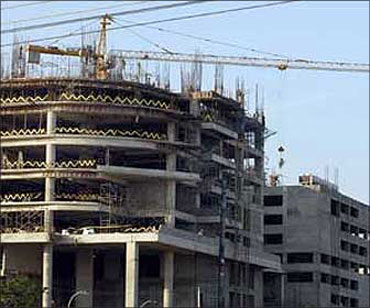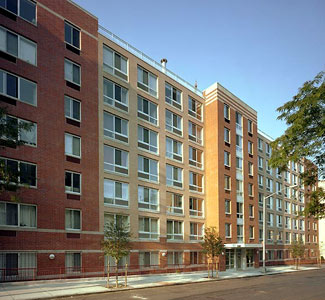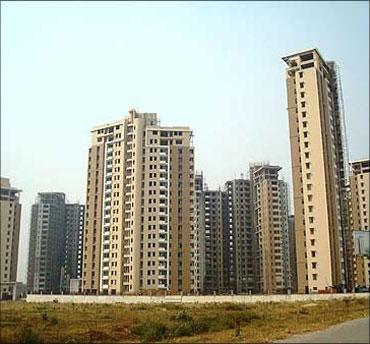
Real estate developers, who need to pay around Rs 25,000 crore (Rs 250 billion) on debt instalments in the current financial year, could face an uphill task. For, equity issuances remain uncertain and cash flows have dwindled.
According to Reserve Bank of India estimates, developers have piled up debt of Rs 75,000 crore (Rs 750 billion). Public sector banks restructured debt worth Rs 10,000 crore (Rs 100 billion) in 2009 and allowed them a roll over.
By March 2011, developers need to repay this amount. An additional Rs 15,000 crore (Rs 150 billion) will be due this year, says a recent report by Kim Eng Securities. What has made matters worse for developers is that the Reserve Bank of India has already ruled out fresh restructuring for them.
Equity route risky
The equity route, earlier a hot favourite of property developers to repay debt and fund projects, is turning out to be tough. After developers such as Omaxe could not raise fresh equity, Delhi-based Parsvnath had to cut its Qualified Institutional Placement size by half, due to poor investor response. Sobha Developers had to reduce the amount expected from a QIP after it failed to raise funds in its first attempt last June.
. . .

However, HDIL, Ansal API and Omaxe are planning to raise funds through QIPs to fund their plans and repay debt. "Investors are not considering QIPs unless they are a very good opportunity. That window is, anyway, very small,'' says Ambar Maheshwari, director of investments at DTZ, an international property consultant.
A senior analyst from an international rating firm said those who had raised equity in the past six to 12 months are better off than those planning to raise it now. "Those now planning QIPs and IPOs (initial public offers) to repay debt will face more challenges," he said.
DLF, Unitech and Indiabulls Real Estate were among those who raised Rs 11,000 crore (Rs 110 billion) through equity issuances last year to repay debt and fund projects.
"Though cash flows have improved compared to last year, there are some concerns in markets such as Mumbai and NCR (national capital region around and including Delhi) where sales are down," the analyst from a rating firm added.
. . .

According to Liases Foras, a realty research firm, home sales have fallen by 15-20 per cent from December 2009 levels and more than half since June last year in markets such as Mumbai. The key reason cited was the more than 30 per cent rise in home prices since June.
Even unlisted developers are staring at uncertain IPOs, given the kind of response recent public issues have got from investors, analysts say. Two recent issues, of Jaypee Infratech and Nitesh Estates, were subscribed barely once.
Though at least 10 public issues by developers such as Emaar MGF, Lodha Developers, Oberoi Realty, BPTP and others, worth over Rs 10,000 crore, have got the nod of capital markets regulator Sebi, they are yet to announce offer dates. And, most of them are banking on their IPOs to repay a significant amount of their debt.
Emaar MGF, which had a debt of Rs 5,807 crore (Rs 58.07 billion), according to its prospectus, plans to use 33 per cent of its Rs 3,850-crore (Rs 38.50 billion) IPO proceeds to pay off its debt. BPTP plans to use a fourth of its IPO funds to repay and prepay debt.
. . .

"Cash-strapped developers are not deemed to be IPO-ready. If they do not have 30 to 40 per cent of targeted IPO funds, how can they get QIBs and investors to invest in the IPO?'' asks an executive director of a global investment banking firm, who did not want to be named.
Adds Ajit Krishnan, partner at Ernst & Young: "Even if the IPO market revives, it is not as robust to help them repay their entire debt. Since most of them are dealing with medium-term debt, they should have sufficient coverage, otherwise there could be issues.''
Possible moves
"As recent attempts by some developers to raise more cash have failed, they may be forced to sell assets, clear inventory at discount or raise new debt to fund cash flow shortfalls,'' says the report from King Eng Securities.
According to the brokerage, listed developers still need Rs 16,000 crore (Rs 160 billion) to fund their projects. For instance, DLF, the country's largest developer, said it planned to raise Rs 2,700 crore (Rs 27 billion) from asset sales in the next 18 months. The company has total debt of Rs 16,000 crore and a debt repayment obligation of Rs 2,600 crore (Rs 26 billion) in 2009-10.
. . .

However, despite all these concerns from rating firms and analysts, developers are confident of sailing through the troubled waters. "It is not as worrying a situation as in 2007-08. Repayment obligations are there but developers would meet them. Banks are absolutely covered against the loans they have lent,'' says Ramashraya Yadav, head of finance at Orbit Corporation, a Mumbai-based developer.
Adds an associate vice president at an equity brokerage: "If banks do not do it, NBFCs (non-banking financial companies) and financial institutions will do it. Both HDFC and LIC (Life Insurance Corporation) are increasing their exposure to developers,'' he says and adds: "How can banks earn net interest margins of 3-4 per cent if they do not lend to developers?"
But, Amit Goenka, national director of capital transactions at Knight Frank, has doubts on NBFCs appetite to do restructure debt. "It would be a debt trap. If they borrow at 16-17 per cent to service their debt at 14-15 per cent, it will not solve any problem,'' he says.